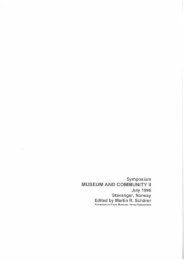Key Concepts of Museology - ICOM
Key Concepts of Museology - ICOM
Key Concepts of Museology - ICOM
You also want an ePaper? Increase the reach of your titles
YUMPU automatically turns print PDFs into web optimized ePapers that Google loves.
vation Committee) is much more<br />
clearly connected with the work <strong>of</strong><br />
conservation and restoration, as described<br />
above, than with the work <strong>of</strong><br />
management or overseeing <strong>of</strong> the<br />
collections. New pr<strong>of</strong>essional fi elds<br />
have evolved, in particular collection<br />
archivists and registrars. The notion<br />
<strong>of</strong> preservation takes account <strong>of</strong> all<br />
these activities.<br />
3. The concept <strong>of</strong> preservation,<br />
in addition, tends to objectivise<br />
the inevitable tensions which exist<br />
between each <strong>of</strong> these functions (not<br />
to mention the tensions between<br />
preservation and communication or<br />
research), which have <strong>of</strong>ten been the<br />
target <strong>of</strong> much criticism: “The idea<br />
<strong>of</strong> conservation <strong>of</strong> the heritage takes<br />
us back to the anal drives <strong>of</strong> all capitalist<br />
societies” (Baudrillard, 1968;<br />
Deloche, 1985, 1989). A number <strong>of</strong><br />
acquisition policies, for example,<br />
include deaccession policies at the<br />
same time (Neves, 2005). The question<br />
<strong>of</strong> the restorer’s choices and,<br />
generally speaking, the choices to<br />
be made with regard to conservation<br />
operations (what to keep and what to<br />
discard?) are, along with deaccession,<br />
some <strong>of</strong> the most controversial issues<br />
in museum management. Finally,<br />
museums are increasingly acquiring<br />
and preserving intangible heritage,<br />
which presents new problems and<br />
forces them to fi nd conservation<br />
techniques which can be adapted for<br />
these new types <strong>of</strong> heritage.<br />
CORRELATED: ACQUISITION, DOCUMENT, ITEMS,<br />
MONUMENT, GOODS, PROPERTY, SEMIOPHORE, THINGS,<br />
RELIC (HOLY), WORK; HERITAGE, INTANGIBLE, MATERIAL;<br />
REALITY; COMMUNITY; PREVENTIVE CONSERVATION,<br />
REMEDIAL CONSERVATION, SAFEGUARD; COLLECTION<br />
MANAGEMENT, COLLECTION OVERSIGHT, COLLECTION<br />
MANAGER, CURATOR, CONSERVATOR, INVENTORY,<br />
RESTORER; DEACCESSION, RESTITUTION.<br />
PROFESSION<br />
n. – Equivalent in French: pr<strong>of</strong>ession; Spanish:<br />
pr<strong>of</strong>esión; German: Beruf; Italian: pr<strong>of</strong>essione;<br />
Portuguese: pr<strong>of</strong>i ssāo.<br />
Pr<strong>of</strong>ession is defi ned fi rst <strong>of</strong> all in a<br />
socially defi ned setting, and not by<br />
default. Pr<strong>of</strong>ession does not constitute<br />
a theoretical fi eld: a museologist<br />
can call himself an art historian or a<br />
biologist by pr<strong>of</strong>ession, but he can<br />
also be considered – and socially<br />
accepted – as a pr<strong>of</strong>essional museologist.<br />
For a pr<strong>of</strong>ession to exist, moreover,<br />
it must defi ne itself as such, and<br />
also be recognised as such by others,<br />
which is not always the case in the<br />
museum world. There is not one<br />
pr<strong>of</strong>ession, but several museal pr<strong>of</strong>essions<br />
(Dubé, 1994), that is to say<br />
a range <strong>of</strong> activities attached to the<br />
museum, paid or unpaid, by which<br />
one can identify a person (in particular<br />
for his civil status) and place him<br />
in a social category.<br />
If we refer to the concept <strong>of</strong> museology<br />
as presented here, most museum<br />
employees are far from having received<br />
the pr<strong>of</strong>essional training that<br />
their title would imply, and very few<br />
can claim to be museologists simply<br />
because they work in a museum.<br />
There are, however, many positions<br />
which require a specifi c background.<br />
ICTOP (The <strong>ICOM</strong> International<br />
67
















